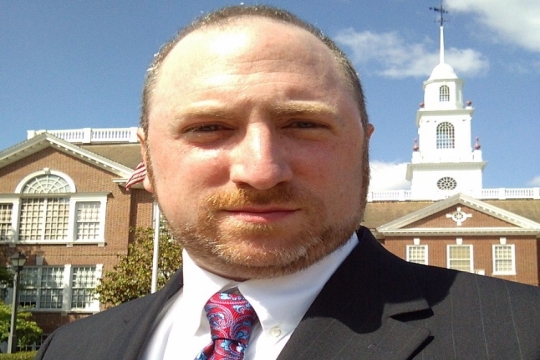
Earlier this Spring, the New Hampshire state legislature voted to abolish the death penalty, which would make NH the 20th state to put an end to capital punishment. Currently, the bill is waiting on Governor Chris Sununu's signature. In March, Rabbi Robin Nafshi of Temple Beth Jacob in Concord testified before the State Senate to explain why Reform Jews are steadfast in our belief that there is no crime which justifies society to take a human life. This post is adapted from her testimony.
I am aware that many in the New Hampshire legislature feel very strongly that their religious views guide them in making law and public policy for our state and frequently look to the Bible for direction. I therefore wish to offer some insights into the biblical application of the death penalty.
The Bible – what Jews call the Hebrew Bible and others call the Old Testament – lists at least 21 offenses that are punishable by death. Yet, within the Bible itself we see no actual application of the death penalty. In fact, approximately 2000 years ago, the ancient Rabbis whose responsibility it was to interpret the laws of the Bible concluded that application of the death penalty had never occurred in the Bible – or perhaps only once. They ruled that going forward, in order to apply the death penalty, the prosecution would have to prove that:
- a witness saw an individual about to commit a crime for which the punishment was death
- the witness would have to warn the person not to act
- the person committed the crime nonetheless
- and a minimum of two witnesses saw the person commit the crime.
In other words, they created a standard making application of the death penalty impossible. The Rabbis stated specifically, “Perhaps a witness testifies that he saw a man running after his fellow into a ruin, the witness pursued him and found him with a sword in his hand dripping with blood while the murdered man was writhing in agony. If this is what you saw,” the Rabbis say, “then you saw nothing.” (Sanhedrin 37b)
Jews, like Christians, Muslims, Buddhists, Hindus, and other religious people, are not of one mind. Jews have divided ourselves into four groups – denominations – and we frequently disagree on issues. On the death penalty, however, we are united in our opposition. We believe that:
- Only God is infallible. Humans being human will make mistakes. As many as 300 people in the 20th century were wrongly convicted of capital offenses.
- No evidence has proven that the death penalty is a deterrent to crime.
- All human beings possess the power of repentance; the death penalty removes this possibility.
The modern state of Israel is the only nation in the world that governs in accordance with both democratic and Biblical principals. Israel repealed its death penalty after using it once. To kill whom? Not Yigal Amir who assassinated Prime Minister Yizchak Rabin. He sits in prison. Not terrorists who have blown up university cafeterias, pizza places, coffee houses, discos, and scores of other public gathering places. They, too, sit in prison. No, the only application of the death penalty in Israel was to kill Adolph Eichmann, a Nazi war criminal.
Others have raised the Biblical injunction of “an eye for an eye, a tooth for a tooth” as showing support for the death penalty. This is not so. There is no evidence anywhere, literary or archaeological, that a literal “eye for an eye” was the Jewish practice at any time. Nor is there the slightest hint in the Talmud, the principle body of Jewish law, that this verse was ever taken literally.
This might sound outrageous. It says so in the Bible, so it must mean what it says. But to make that assumption is to know nothing about the way Jewish people read, study, and follow the Biblical text. The Bible, for Jews, is understood only through the ongoing process of interpretation. The first and primary source of that interpretation is the Talmud, which dates from around the 6th century.
The Talmud records a lengthy discussion among Rabbis concerning the verse “an eye for an eye” (Bava Kama 83b-84a). The Rabbis cite several compelling proofs showing that one should not even entertain the thought that “an eye for an eye” is to be taken literally. Later rabbis who offered additional interpretations of the verse agreed. Maimonides, a renowned 12th century sage, notes that the verses in Exodus (21:18-19) regarding the payment of money to compensate someone for damages are just a few verses earlier and thus applicable in the situation of “an eye for an eye.”
If the Biblical text is about monetary damages, why does it seem to say otherwise? The Maharal, a 16th century sage, suggests that it is based upon the idea that a person who injures or even kills another must feel a profound sense of responsibility for one’s actions. Had the Bible simply ordered the aggressor to pay damages, he might have thought that it is sufficient to simply write a check to the victim and be done with it.
The Bible, however, is teaching that if one causes the loss of limb or even life to another, he emotionally deserves to have the same done to him, in order to contemplate the profound damage done to the other – or to the other’s survivors. The aggressor should know the pain and suffering and losses endured by the other, other’s survivors – for the rest of his life. But society cannot endure the actual retribution of taking another’s eye or limb or life. And so monetary payment – and we hope repentance – are the most we can demand.
If the Jewish application of the Biblical death penalty does not persuade you to pass this bill and suspend the use of the death penalty, perhaps a look at the status of the death penalty in nations where Christianity is the official religion or where the governments give special recognition to Christian religions will.
- Andorra, outlawed in 1990
- Argentina, outlawed in 2008
- Costa Rica, outlawed in 1877
- Denmark, outlawed in 1933
- Dominican Republic, outlawed in 1966
- Finland, outlawed in 1949
- Republic of Georgia, outlawed in 1997
- Greece, outlawed in 1993
- Haiti, outlawed in 1987
- Honduras, outlawed in 1956
- Iceland, outlawed in 1928
- Italy, outlawed in 1947
- Liechtenstein, outlawed in 1987
- Malta, outlawed in 1971
- Monaco, outlawed in 1962
- Norway, outlawed in 1905
- Paraguay, outlawed in 1992
- Poland, outlawed in 1997
- Portugal, outlawed in 1867
- Slovenia, outlawed in 1989
- Spain, outlawed in 1978
- Switzerland, outlawed in 1942
Rabbi Robin Nafshi is the rabbi at Temple Beth Jacob in Concord, NH.
Take action: Tell Governor Chris Sununu to sign the bill and end the death penalty in New Hampshire.
Related Posts

Repeals on the Ballot: Measures to End the Death Penalty in November

